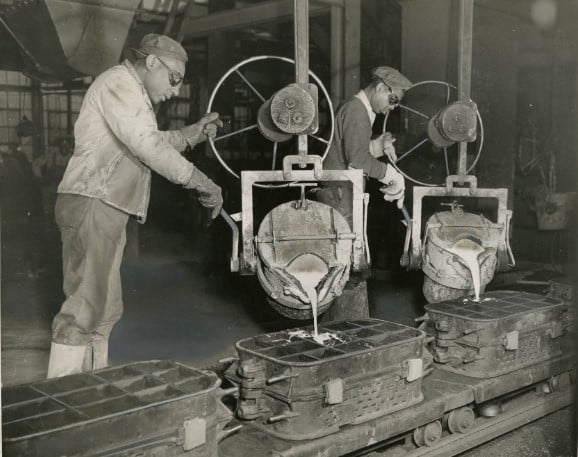
The University of Tennessee at Chattanooga Library’s Special Collections department has secured a grant to digitize documents and photographs detailing the history of labor and industry in Chattanooga.
The $3,630 grant awarded by the Tennessee Historic Records Advisory Board with funds provided by the National Historic Publications and Records Commission provides for Special Collections to hire a student assistant during the spring 2023 semester to scan and write metadata for materials in the library’s possession.
Director of Special Collections Carolyn Runyon and Manuscripts Archivist Erin Ryan wrote the grant application.
“There is a widespread interest in labor history today among researchers,” said Ryan, the grant’s principal investigator. “In line with that trend, we receive inquiries in Special Collections for help with projects related to labor in Chattanooga. Right now, the bulk of our holdings in that area have not been digitized, which limits the reach of how many people can find and use them.
“The funding we have received for this project will allow us to create dedicated digital collections related to labor and industry in our area and to make these collections freely available on our website where global audiences can discover them.”
During the grant-funded project, Special Collections will digitize more than 200 photographs and approximately 134 pages of materials, booklets and correspondence documenting early Chattanooga manufacturing companies.
Ryan noted that Chattanooga became an industrial center in the South after the Civil War and was known as the “Dynamo of Dixie.” The city attracted industries that included iron fabricators and textile mills like Wheland Foundry, which began operating in Chattanooga around 1874;
U.S. Pipe and Foundry, founded in 1887; and Dixie Mercerizing Company, organized in 1919.
“The collections are meant to contribute to primary source material about industrialization, including the roles of Black people and women in foundries and mills,” Ryan said, “as well as to inform research about the environmental impact of industrialization.”
Wheland Foundry closed in 2002, followed four years later by U.S. Pipe and Foundry’s Chattanooga property. Dixie Mercerizing Company has had numerous name changes and is now known as The Dixie Group.
Some of the images in the digital collections will include: photographs of Black and white laborers working together in the foundry during the Jim Crow era; aerial photographs of the foundry complex, as well as photos of equipment; images of women working in different departments of the textile factory; and a booklet showcasing the Dixie Mercerizing Company’s operations and their mill village, Lupton City.
“Special Collections hopes that these materials will be able to augment and inform our existing holdings about urban planning and environmental issues,” Ryan said, “and that these materials will be of use not only to scholars but to journalists, students, artists, city planners and many others who may gain from exploring the labor history of Chattanooga.”
